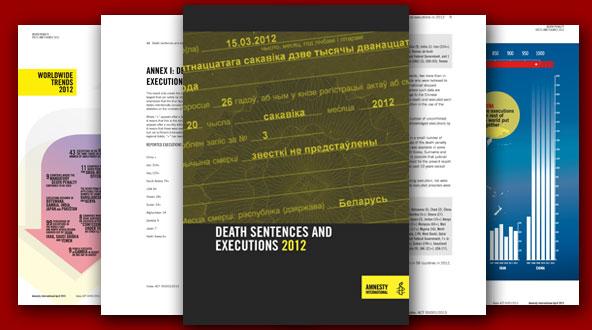
Only one in 10 countries carried out executions in 2012
Statistics
The path towards the abolition of death penalty worldwide took one more step in 2012. The number of confirmed executions remained steady compared to the previous year, according to the latest Amnesty International (AI) report on the death penalty released today.
A total of 682 people were shot, beheaded, hanged or received a lethal injection in 21 countries, which means that about one in 10 states carried out executions. This is a significant decrease from a decade ago: in 2003, 28 countries did. These data, however, do not include figures from China, which is supposed to account for more executions than the rest of the world combined.
“Figures in 2012 show a positive trend all over the world”, said Chiara Sangiorgio, campaigner against the death penalty at Amnesty International, “even if there are some disappointing data.” She referred to India, Japan, Gambia and Pakistan, which resumed executions after a pause of up to 30 years as in the case of Gambia. Egypt and Syria may also have experienced a setback, but none could be confirmed.
Top five executers unchanged
The top five global executers remain the same. Three quarters of confirmed executions took place in Iran, Iraq and Saudi Arabia. The US was the only country in the Americas to carry out executions, although only nine US states did so in 2012 (compared to 13 in 2011).
Thousands of executions are supposed to have taken place in China, but reliable numbers on the true extent of the use of the death penalty in that country are unavailable and considered a state secret. Sangiorgio pointed out that Beijing introduced some changes to meet international legal requirements (including in the penal code), but they are still “too weak”.
All regions made progress and the total number of abolitionist countries in law or in practice rose to 140 – more than two thirds of the world’s nations. The AI campaigner emphasized positive developments in Africa: the government of Ghana, for example, accepted recommendations towards abolishing the death penalty in its new Constitution, while no death sentences were imposed in Burkina Faso, Malawi or Sierra Leone.
In Central and Southern America and the Caribbean, only Barbados, Guyana and Trinidad and Tobago did imposed a total of 12 capital sentences in 2012.
In Asia, Viet Nam did not sentence anyone to death, and Singapore observed a moratorium on the death penalty while considering legal amendments to its laws.
Belarus continued to be the only country in the European region to carry out executions.
In the Middle East and North Africa, where at least 557 executions were carried out in six countries, Bahrain showed a positive trend for the second consecutive year.
More than 23,000 people on death row
The global trend towards abolition still has to face a wide range of challenges. At least 23,286 people were on death row at the end of 2012. Amnesty International shows its concern for the execution of two people in Yemen for crimes that were committed when they were under 18 years of age, in violation of international law.
Sangiorgio underlined that in many cases people were sentenced to death or executed without a fair trial or after the extraction of ‘confessions’ through torture, as in the cases of Afghanistan, Belarus, China, Iran, Iraq, North Korea, Saudi Arabia and Taiwan.
Categories
Afghanistan Bahrain Barbados Belarus Burkina Faso China Death Row Conditions Democratic People's Republic of Korea Egypt Gambia Ghana Guyana India Iran (Islamic Republic of) Iraq Malawi Moratorium Pakistan Saudi Arabia Sierra Leone Singapore Syrian Arab Republic Taiwan Trinidad and Tobago Viet Nam Yemen






